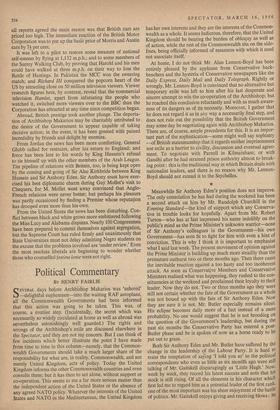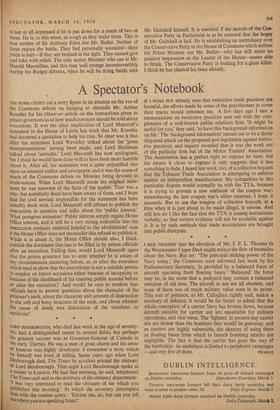Political Commentary
BY HENRY FAIRLIE SEVERAL days before Archbishop Makarios was 'ushered' — d eli ghtful euphemism—into the waiting RAF aeroplane, all the Commonwealth Governments had been informed that this action was going to be taken. This was, of course, a routine step. (Incidentally, the secret which was necessarily so widely circulated at home as well as abroad was nevertheless astonishingly well guarded.) The rights and wrongs of the Archbishop's exile are discussed elsewhere in the Spectator, and they are not my concern. But I can think of few incidents which better illustrate the point I have made from time to time in this column—namely, that the Common- wealth Governments should take a much larger share of the responsibility for what are, in reality, Commonwealth, and not merely United Kingdom, acts of policy. Today the United Kingdom informs the other Commonwealth countries and even consults them; but it has then to act alone, without support or co-operation. This seems to me a far more serious matter than the independent action of the United States or the absence of any agreed NATO policy. Whatever the interests of the United States and NATO in the Mediterranean, the United Kingdom has her own interests and they are the interests of the Common- wealth as a whole. It seems ludicrous, therefore, that the United Kingdom should be bearing the burden of obloquy as well as of action, while the rest of the Commonwealth sits on the side- lines, being officially informed of measures with which it need not associate itself.
At home, I do not think Mr. Alan Lennox-Boyd has been entirely pleased by the applause from Conservative back- benchers and the hysteria of Conservative newspapers like the Daily Express, Daily Mail and Daily Telegraph. Rightly or wrongly, Mr. Lennox-Boyd is convinced that no alternative but temporary exile was left to him after his last desperate and sincere attempt to win the co-operation of the Archbishop; but he reached this conclusion reluctantly and with as much aware- ness of its dangers as of its necessity. Moreover, I gather that he does not regard it as in any way a necessarily final step, and does not rule out the possibility that the British Government may some day be negotiating again with Archbishop Makarios. There are, of course, ample precedents for this. It is an impor- tant part of the sophistication—some might well say sophistry —of British statesmanship that it regards neither imprisonment nor exile as a barrier to civility, discussion and eventual agree- ment. To negotiate with Parnell in Kilmainham; or with Gandhi after he had strained prison authority almost to break- ing point : this is the traditional way in which Britain deals with nationalist leaders, and there is no reason why Mr. Lennox- Boyd should not extend it to the Seychelles.
Meanwhile Sir Anthony Eden's position does not improve. The only consolation he has had during the weekend has been a second attack on him by Mr. Randolph Churchill in the Evening Standard—the kind of support which any Conserva- tive in trouble looks for hopefully. Apart from Mr. Robert Turton—who has at last impressed his name indelibly on the public's mind as the Prime Minister's unknown warrior—none of Sir Anthony's colleagues in the Government—his own Government—has seen fit to fight for him with even a hint of conviction. This is why I think it is important to emphasise what I said last week. The present movement of opinion against the Prime Minister is building up much more steadily than the premature outburst two or. three months ago. Then there came the inevitable reaction against a too hasty and too incoherent attack. As soon as Conservative Members and Conservative Ministers realised what was happening, they rushed to the con- stituencies at the weekend and proclaimed their loyalty to their leader. Now they do not. Two or three months ago they were still not certain whether the fate of the Government as a whole was not bound up with the fate of Sir Anthony Eden. Now they are sure it is not. Mr. Butler especially remains silent. His eclipse becomes daily more of a fact instead of a mere probability. No one would suggest that he is not brooding on the question of the Government's leadership, but during the past six months the Conservative Party has entered a post- Butler phase and he is spoken of now as a horse ready to be put out to grass.
Both Sir Anthony Eden and Mr. Butler have suffered by the change in the leadership of the Labour Party. It is hard to resist the temptation of saying 'I told you so' to the political correspondents who even as little as six month's ago were still talking of Mr. Gaitskell disparagingly as 'Little Hugh.' Now, week by week, they record his latest success and note that his stock is still rising. Of all the elements in his character which first led me to regard him as a potential leader of the first rank, one of the most important was his sheer enjoyment of the battle of politics. Mr. Gaitskell enjoys giving and receiving blows : he is not at all depressed if he is put down for a count of two or three. He is, in this sense, as tough as they make them. This is true neither of Sir Anthony Eden nor Mr. Butler. Neither of these enjoys the battle. They feel personally wounded—their pride is hurt—if they are bruised in the fight. They cannot give and take with relish. The only senior Minister who can is Mr. Harold Macmillan. and this may well emerge incontrovertibly during the Budget debates, when he will be doing battle with Mr. Gaitskell himself. It is essential if the morale of the Con- servative Party in Parliament is to be restored that the bogey of Mr. Gaitskell is laid. He is establishing an ascendancy over the Conservative Party in the House of Commons which neither the Prime Minister nor Mr. Butler—who has still made no positive impression as the Leader of the House—seems able to break. The Conservative Party is looking for a giant killer. I think he has planted his bean already.



































 Previous page
Previous page